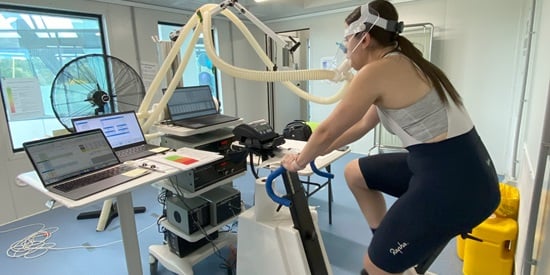A salty boost helps female athletes go the extra mile in the heat
Media release
Women who take a salt tablet with fluid before long distance exercise will perform better in the heat, new research has shown.
The study which tested female endurance athletes found they cycled a set distance 1.5 minutes faster after taking salt tablets with fluid, compared to those who took placebo.
Their performance improved even further when the women were in the post-ovulation phase of their menstrual cycle, a time when it is assumed women are more susceptible to heat stress.
Lilia Convit, PhD candidate in Deakin University's Institute for Physical Activity and Nutrition (IPAN) said the findings were a potential game changer for female high-performance athletes.
'This changes the way we think about athletic performance during the menstrual cycle,' Ms Convit said.
'It has always been assumed that women are vulnerable to heat stress during certain phases of their cycle, like the post-ovulation, or mid-luteal phase.
'But our study shows these challenges can be managed proactively with simple strategies like sodium hyperhydration.'
Ms Convit said the findings open new possibilities for supporting women in sports and ensuring they're not held back by natural hormonal fluctuations.
As part of the study, female athletes were given salt or sugar (placebo) tablets with fluid before they began exercising in the heat and researchers measured their fluid retention, hydration status and exercise performance.
Each athlete was tested during menstruation (between days 1 and 5) as well as the post-ovulation phase of their menstrual cycle (between days 19 and 25).
'The improved hydration with salt tablets and fluid allowed women to cycle faster without changes in body temperature or heart rate, meaning they could exercise at a higher intensity without feeling like it was harder,' Ms Convit said.
'Consuming salt tablets with fluid before exercise is a practical and cost-effective way to enhance exercise performance for female athletes in long-duration events when fluid access is limited and/or maintaining hydration is difficult.'
Ms Convit said the findings underscore the need for more studies on female-specific physiology.
'We now need to look at how this strategy impacts sports that involve weight-bearing or running, where added fluid retention could affect performance. We also need to see the effects on a more diverse group of athletes such as different fitness levels, ages, menstrual cycle profiles, hormonal contraceptive and hormonal replacement users, as well as peri- and post-menopausal women.'
The paper has been published in the International Journal of Sport Nutrition and Exercise Metabolism (IJSNEM).

